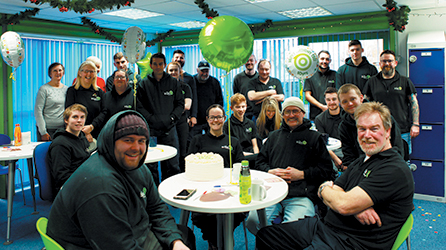Look after your workforce
To those suffering, mental health issues can often feel like a topic that is stigmatised and viewed negatively. Some employees worry that they will be treated differently or be seen to have a weakness if colleagues and employers know that they are struggling. While wellbeing and mental health can be affected by lots of different factors, including loss of accommodation, illness, injury, the breakdown of relationships of the loss of loved ones, amongst many other things, the environment in which you work in can also have a negative effect on wellbeing, especially if you are already struggling.

300,000 people with long-term mental health issues lose their jobs each year
Why is it important to address wellbeing when attempting to maximise staff potential? Around 33 productive days are lost per year to moderate to severe depression by the 5.6% of employees who suffer from it. They can reduce their work impairment by 31 days if they no longer suffer from depression. It is times like these that supporting staff through difficulties becomes even more important.
Create a support system
By implementing solid support systems employers can attempt to retain employees rather than add to the rising figure of workdays lost to poor mental health and wellbeing.
Mental Health First Aid (MHFA) England offers evidence-based research-driven courses to employees. The training is delivered by experts with input from people with lived experience of mental health issues. MHFA is a community interest company with profits going back into driving its social mission – to spread mental health skills and awareness.

Mental Health First Aid (MHFA) England offers courses to employees to help companies support staff wellbeing
The chairman of MHFA England and the chief executive officer of Bower Media Group argue that there needs to be solid support systems in place for those suffering, as well as measures in place to prevent negative effects on wellbeing. They penned a letter calling for a change in law that includes mental health in first aid regulations.
The letter concludes: “Success will ensure employees across the country can access a trained member of staff to receive initial support and guidance if they are dealing with a mental health issue at work. Success will ensure every employee has the right to a mentally healthy environment. Success will mean we can finally break the stigma of mental health in the workplace.”
A study commissioned by the Institution of Occupational Safety and Health (IOSH) and conducted by the University of Nottingham looked into the benefits of MHFA England’s training. It found that following training, 87% said more mental health conversations were happening. A further 78% said that employees trained in MHFA were supporting colleagues, and 59% reported an increase in help-seeking behaviour.
Listen to your employees
Last year, Astley conducted a companywide quality assessment including an employee survey. It was when its employees expressed a want for a formal health, safety and wellbeing programme that the firm decided to update and create a meaningful strategy and implementation programme for this.
Lindsay Burnham, head of brand and creative at Astley explains: “As part of our health and wellbeing programme we provide fruit, have trained colleagues as mental health first aiders and are members of Mates in Mind – an organisation which looks to improve mental health in the construction industry.”
Burnham adds that the firm has experienced a positive response to the introduction of mental health first aiders: “The role of the mental health first aider is to signpost their colleagues to specialist help if needed but most importantly they can listen and provide confidential support to colleagues. Each mental health first aider is from a different department so there is support to everyone regardless of their roles in business.”

Each mental health first aider is from a different department so there is support to everyone regardless of their roles in business”
Help your staff thrive
In any busy company it is easy to feel overworked, undertrained and unsupported. Understanding the risk this can have on employees’ mental health, FASTSIGNS encourages all its centres to support staff in as many ways as possible to prevent this from happening.
John Davies, managing director of FASTSIGNS UK says: “By consistently providing training opportunities we are empowering staff in their roles, ensuring capability and actively safeguarding against situations that could make staff feel anxious or experience negative mental health.
“Employees also benefit as they improve their skill set, enabling them to progress in their career, do well in their role and experience a sense of positive self-actualisation. Training is also provided to franchisees, by equipping them with managerial methods to deal with any issues staff may have, ensuring they have an open door and have the personal skills to respond in the appropriate way.”

The FASTSIGNS Leeds team get together over some pizza
According to Personnel Today, leadership is essential to embedding health within an organisation, as is role modelling. At FASTSIGNS, its global chief executive officer, Catherine Monson is passionate about staff wellbeing and positivity.
Davies adds: “Catherine Monson actively promotes fitness, upbeat activity and positivity. Mental health is something we take very seriously across the whole business. We pride ourselves on promoting an open and approachable culture, one where all members of our team feel confident that they can speak to any member of staff or management if they feel they are struggling with their mental health.”
At The Sign Group, creating a space for colleagues to speak openly about difficulties is an important factor. The firm’s Lydia Wrightson, explains: “We have, and always have had an open-door policy when it comes to mental health issues. Over the last couple of years, we’ve been more vocal about the importance of talking about any problems people may be having with their line manager or another person they trust. Any problems raised are dealt with in confidence and we understand everybody reacts differently to challenges in their lives and there is no one size fits all solution. We’ll do whatever we can to help.”
According to Wrightson, the company experienced first-hand a correlation between staff wellbeing and productivity when it moved into a new building.
Wrightson says: “When we moved into the new building, one of our aims was to improve staff morale and productivity. Since we have made small changes to the way we work and got a good balance between hard work and downtime, we’ve noticed relationships between departments have improved a lot as well as a big change in staff moods.

The Sign Group staff celebrate its tenth anniversary
“The different departments were almost tribe-like before with tension between them whenever things got tough or busy, but we don’t see that anymore. With relationships being good now, we’ve seen the quality of work and productiveness increase tenfold. We only wish we’d addressed it sooner.”
Rallying for change
Mates in Mind is an organisation which aims to support employers to improve mental health and wellbeing across UK workplaces and industries, with a focus on the construction sector.
This year, the organisation has been chosen as a headline charity for the first ever Regatta London – a unique fundraising event in which participants get to paddle and row down London’s River Thames.
Events such as these allow Mates in Mind to raise awareness and funds and continue doing the work it does to look after workplaces in the UK.
According to the organisation, the agenda in respect of health and safety management has shifted due growing awareness of the importance of addressing health just as we do safety.
Joscleyne Shaw, director of strategy for Mates in Mind explains that this emerging conversation within the construction sector began a few years ago. This was led by the Health in Construction Leadership Group (HCLG) and with the support of the British Safety Council, Mates in Mind was established.
When asked how employers can work to look after staff wellbeing, Shaw says: “While employers cannot cure psychological or psychiatric conditions, in the same way as they cannot cure cancer or a broken leg, it is vital that mental ill-health is accepted as the debilitating sickness it can be.
O Factoid: A government-commissioned review concluded that 300,000 people with long-term mental health issues lose their jobs each year. O
“Mates in Mind recognises that in addressing and supporting people’s wellbeing at work, specifically in relation to mental health, each workplace will have its own approach. Central to this is our support which helps organisations in creating, communicating and delivering a more coherent approach to mental health and wellbeing in line with their own needs and priorities.”
Shaw adds that there is a need for much more information and guidance for line managers on how to spot signs of illness in order to change the silence culture: “This guidance needs to help them to initiate a conversation with a worker and provide the tools to continue in an appropriate way moving forward.”
A big part of the sign industry is the practical nature of sign-making and fabrication. Often workers will be operating inside large workshops and factories with little light, limited interaction with others or will be travelling to various locations to complete installations, spending a lot of time on the road.
Research from the Office of National
Statistics has found that the construction and related industries are a particularly high-risk area of the UK’s workforce with the suicide rate among those in the finishing trades twice the national average.

Research from the Office of National Statistics has found that the construction and related industries are a particularly high-risk area of the UK’s workforce for mental ill-health
Shaw explains: “As part of the complex challenge that mental ill-health poses the industry, factors such as long hours, the financial insecurity that can arise from contracted work and working for extended periods of time away from family and friends, can all significantly impact an individual’s mental health.”
Despite these figures, Shaw explains that the culture of mental health silence is beginning to change, with actions being taken from everywhere from education to government.
Shaw concludes: “In line with our holistic approach to mental health, at Mates in Mind we recognise that change in culture will only come about if we begin with changing the way we think and talk about mental health.
“That in turn means that with each action taken to tackle an issue, we will move closer to a more engaged and inclusive environment in which we ca n thrive – individuals, communities and businesses alike.”
Make the step
As with any aspect of mental health, it is not a straightforward task to increase conversation, remove the taboo, and even make it a priority in the first place. Wrightson reflects on the path The Sign Group took to address staff wellbeing and the positive impact it has had: “Admittedly, we’ve been guilty in the past of not making staff wellbeing our first priority. We were wrong to work like that. It’s not as if we didn’t care about our staff and their wellbeing, it was more a case of not realising how important staff wellbeing and morale was to a business working and being successful.

Admittedly, we’ve been guilty in the past of not making staff wellbeing our first priority. We were wrong to work like that”
“You don’t have to spend hundreds of pounds a month on treats or take everybody to Disneyland once a year to be a great boss and create an enjoyable working environment. Simply making staff aware of how valued they are and treating them like human beings and not money-making robots is enough. I’d encourage any business owner to look into the ways they can improve their working environment for their staff, however small the changes, they can have a big impact on your business.”
Your text here...